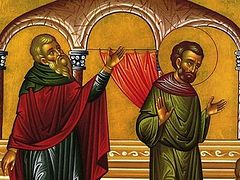Archimandrite Job (Gumerov), a well-known father confessor at the Moscow Sretensky Monastery, answers questions about the most important virtue for every Christian: humility.
Learn of Me; for I am meek and lowly in heart:
and ye shall find rest unto your souls (Mt. 11:29)
—Father Job, your blessing. Can you please explain what humility is?
—One day Abba Anthony the Great said: “Once I saw all the devil’s snares spread all over the earth. Then I groaned sighing, ‘Who can escape such snares?’ And I heard a voice answering me, ‘Humility.’”
Humility is a state of mind freed from passions. It manifests itself in relation to God, people and yourself. Neither the world with its temptations, nor the flesh, nor the love of glory, nor jealousy, nor envy make a humble person a captive.
The perfect example of humility was shown by the Mother of God. According to the Holy Fathers, She possessed this most important Christian virtue from infancy. She said of Herself: For He hath regarded the low estate of His handmaiden: for, behold, from henceforth all generations shall call me blessed (Lk. 1:48). After the Ascension of Her Divine Son, She lived in anticipation of departing this earthly life. She did not teach anyone, did not instruct anyone, but loved solitude, devoting herself to prayer.
The Holy Scriptures speak about humility as the highest virtue: When pride cometh, then cometh shame: but with the lowly is wisdom (Prov. 11:2); The Lord is nigh unto them that are of a broken heart; and saveth such as be of a contrite spirit (Ps. 33:19); He hath shewed thee, O man, what is good; and what doth the Lord require of thee, but to do justly, and to love mercy, and to walk humbly with thy God (Mich. 6:8).
St. Ephraim the Syrian said, “The Apostles armed themselves with humility, true believers conquered with it; it brought victories to both the ancient and the new. Gird yourselves with this weapon, O disciples of Christ, because with it you will gain victories and become heirs of the Kingdom. Let he who loves victory arm himself with this weapon; he who wants to enter the Kingdom, enter through these gates. Humility is the path to the Kingdom.”
 St. Seraphim-Diveyevo Tenderness Icon of the Most Holy Theotokos
St. Seraphim-Diveyevo Tenderness Icon of the Most Holy Theotokos
—Is it possible to acquire this virtue in the world, and not only in a monastery?
—Early monasticism aimed to bring the heart into stillness. Humility was born from the stillness of the heart. However, even in the world, a person can and should strive to attain humility. One day St. Anthony the Great heard a voice, saying, “Anthony, you have not yet attained the level of such-and-such a shoemaker who lives in Alexandria.”
We read in the Patericon: “The next morning the elder got up, took his palm staff and went to the shoemaker. When he arrived, he greeted him, and then sat down next to him and said to him, ‘Tell me, brother, about your work.’
“And the shoemaker replied, ‘Abba, I do not know what good I have done. Except that every time I get up in the morning and get to work I tell myself that this whole city, from the youngest to the oldest of its residents, will enter the Heavenly Kingdom for their righteousness, and I alone will go to hell for my sins. And in the evening, before going to bed, I repeat the same words.’
“The elder said, ‘Truly, you as a good shoemaker have lived quietly at home and inherited the Kingdom. But I had no prudence, and over the time that I spent in the desert I did not attain your level.’”
—What should a Christian living in the world do in order to become humble ?
—Don’t be proud, don’t be vain, don’t judge anyone, be well-disposed to everyone, don’t be discouraged under any trials and don’t give up hope in the Lord. Humility is the surest way to gain victory over sin. We Christians should always be ready to stand before the Lord and Righteous Judge and give an account for our whole lives. In order to prepare for the Judgment and be justified we should start every day with the thought that we have done nothing for our salvation yet, and there will be no other day. In associating with many people during the day, we should always try maintain humility.
—How can we act in accordance with this virtue when, for example, someone had been rude to us or offended us?
—We Christians should not apply human logic, but should believe in the effect of the spiritual law: If we forgive the offender who has wronged us and is not going to apologize, then the all-powerful Lord, seeing our humility, will help us. God resisteth the proud, but giveth grace unto the humble (Jas. 4:6).
There was a monk named Theodore at the monastery where the abbot was St. Cyril of White Lake. Tempted by demons, he came to hate his abbot so much that he could not even look at him. Theodore decided to leave the monastery. Before leaving he came to the abbot’s cell. The venerable father said to him, “Do not grieve, my brother. Everyone else is mistaken about me, you alone know the truth and all my unworthiness; I am really the most despicable sinner.” The saint’s love and humility freed the unfortunate monk from demonic captivity. Hatred was gone and Theodore remained living quietly in the monastery.
 St. Cyril’s White Lake Monastery. Photo: Vsegda-pomnim.com
St. Cyril’s White Lake Monastery. Photo: Vsegda-pomnim.com
I’ll give you another example. One day, Holy Hierarch Tikhon of Zadonsk came to a landowner he knew. At that time a nobleman who was a free-thinker was visiting him. A dispute about the faith began. At some point the guest lost his temper and hit St. Tikhon. The saint immediately fell to his knees and asked his forgiveness, saying, “Forgive me, for God’s sake, for bringing you into such a frenzy.” It was not just the saint’s meekness, but his feat of humility that worked a miracle: The obstinate guest himself fell to his knees, tearfully begging to be forgiven. Grace touched his heart. He changed his way of life and became a true believer.
When we think that our offender must be put in his place so that the evil would not go unpunished, we thereby show that we remain in the logic of purely human relations, forgetting that God works in our lives. Our Lord and Savior not only gave us the commandment to forgive those who have wronged us, but He Himself showed the greatest example of absolute forgiveness: While dying on the Cross, He asked God the Father to forgive those who were crucifying Him, Father, forgive them; for they know not what they do (Lk. 23:34).
—What are some examples of saints that we can recall when we talk about humility?
—For example, St. Paulinus the Merciful, Bishop of Nola (353–431). He was born into an aristocratic family. At the age of twenty, he became a senator under the Roman Emperor. In the following years he was a consul and ruled the Italian region of Campania. At the age of twenty-five, together with his wife Tarasia, he received holy baptism. They sold their possessions and distributed everything among the poor. The couple took a vow of chastity. The desire for solitude prompted them to move to the Spanish city of Barcelona. There St. Paulinus yielded to the desire of the faithful and became a priest. He took special care of orphans, fed the poor, and showed mercy to the suffering.
Then he and Tarasia took up their residence in the town of Nola in Campania. There they founded a monastic community with a very strict ascetic life. In 409 (according to other sources, in 411), to the general joy of the faithful, St. Paulinus was elected bishop of Nola. In his new rank, he remained a merciful pastor who loved the poor. When the Vandals attacked Italy and took many people as slaves, Bishop Paulinus began to use all the funds available in the diocese to ransom prisoners.
Later a widow came whose son had been taken captive. When she learned that Bishop Paulinus had no more money, she started crying bitterly. But the saint said there was a way out—he would sell himself into slavery in exchange for her son. Dressed in secular clothes, he and the widow went to North Africa to the Vandals’ camp. The widow’s son was freed, and the bishop became a slave of the chief’s son-in-law. He asked Bishop Paulinus what he can do. He replied that he can take care of the garden. So Bishop Paulinus became a slave. However, Divine Providence arranged everything for the greater good. Not only did St. Paulinus perform a feat of extraordinary humility, but he also returned to his archpastoral ministry. With him all the numerous captives who had previously been taken by the Vandals were freed.
 St. Paulinus the Merciful, fragment of a banner. Photo: psgp.ru
St. Paulinus the Merciful, fragment of a banner. Photo: psgp.ru
Another example is St. Vitalius of Alexandria (the seventh century). He was a monk in Gaza. At the age of sixty he left the monastery and moved to Alexandria, where he became a hired hand. He would receive twelve copper coins. He used one coin to buy some vegetable, which he ate at the end of the day. Then he went to where harlots lived. He gave the remaining coins to a harlot and asked her to give up her sinful way of life. Then he would close the door. While she was asleep, he prayed for her all night long. Every night he would go to another harlot, until, having visited all of them, he again began with the first one. He asked them not to tell anyone how he spent nights. All the city residents shamed him and reviled at him. He would reply calmly, “Don’t I have a body like all human beings?”
Many harlots abandoned their profession and began to live in purity. Some became nuns, others—wives and mothers. One day Vitalius didn’t come to anyone. They entered his cell and found him dead. St. Vitalius had passed away on his knees during prayer. There was a scroll in his hands with the inscription: “Do not judge anyone until the Lord, the Righteous Judge, comes.” The women whom St. Vitalius had asked to reform began to flock to the cell and speak about the virtues of the elder, who had not touched any of them. Many blind and lame people were healed when they touched the venerable man’s body.
 Venerable Pimen the Much-Ailing Another example is St. Pimen the Much-Ailing (†1110). He was born with an illness. From childhood he wanted to become a monk. But his parents wanted to see him as their heir. When the illness got worse, his parents took him to the Kiev-Caves Monastery, but not for tonsure. They wanted the venerable fathers to pray for their son’s recovery. When night fell and the parents fell asleep, angels appeared in the cell in the form of the abbot and the brethren and tonsured Pimen. After that he became so ill that he could only lie in bed. He was sick for twenty years. The Venerable Pimen humbly endured the illness and asked the brethren not to pray for his healing.
Venerable Pimen the Much-Ailing Another example is St. Pimen the Much-Ailing (†1110). He was born with an illness. From childhood he wanted to become a monk. But his parents wanted to see him as their heir. When the illness got worse, his parents took him to the Kiev-Caves Monastery, but not for tonsure. They wanted the venerable fathers to pray for their son’s recovery. When night fell and the parents fell asleep, angels appeared in the cell in the form of the abbot and the brethren and tonsured Pimen. After that he became so ill that he could only lie in bed. He was sick for twenty years. The Venerable Pimen humbly endured the illness and asked the brethren not to pray for his healing.
By the great feat of humility and Christian patience he acquired special grace—he could heal anyone. When food was brought to him or people were visiting him, he sometimes asked to call some sick brother to him. They would reply, “So-and-so can’t come, he’s sick and in bed.” The saint would answer, “Tell him that Pimen is calling him.” And as soon as they would say, “Pimen is calling you”, the sick brother would get up healthy and could walk.
—What are the fruits of humility?
—The reward to those who have attained humility is peace of mind and joy in the earthly life and the Heavenly Kingdom in the future. “It is not our efforts, not our labors, not time that delivers us from passions, but the grace of God, which is sent down only to the humble” (St. Joseph of Optina).




